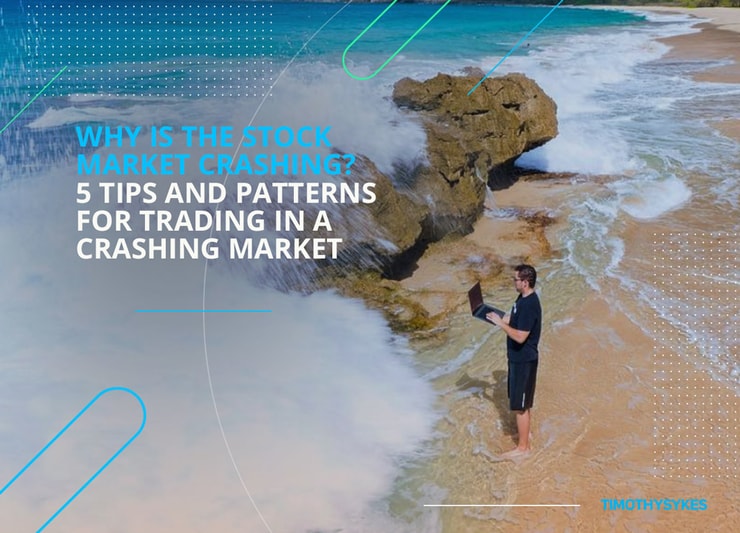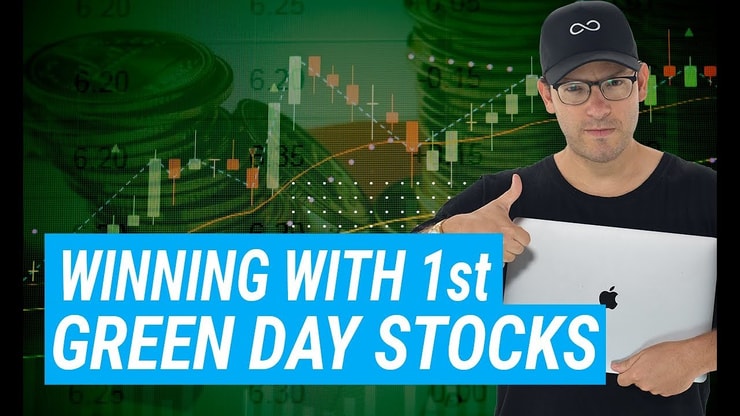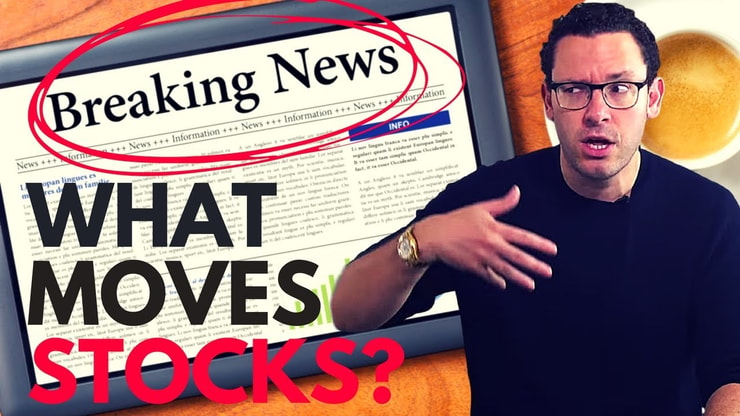No doubt you’ve heard the term ‘stock market crash’ before — but do you know how you can use it to your advantage as a trader?
Maybe you’re not exactly sure what a crash is …
Before we can get into that, there are two questions we need to tackle:
- What is a stock market crash?
- Is the stock market crashing?
Let’s get cracking on these questions, then I’ll show you how a crashing market can potentially help — not hurt — your trading.
Table of Contents
What Is a Stock Market Crash?
A stock market crash is pretty simple: Essentially, it’s a generally unexpected and significant dip in stock prices.
There aren’t really set guidelines here, but a crash is typically marked by a rapid, double-digit-percentage drop in a stock index.
Let’s look at a few major stock market crashes that you probably already know.
The first — and most famous — is the financial market crash in 1929 that caused the Great Depression.
More recently, there’s the housing market crash of 2008.
So … what causes the stock market to crash?
Several factors can cause a stock market crash. Think major worldwide catastrophes or the collapse of a speculative bubble (see: the collapse of the housing bubble in 2008).
A sudden market collapse can result from a number of causes …
Add in a heavy dose of panic (investors are known for poor, reactionary decisions) and the crash goes from bad to worse.
Stock Market History
The stock market has a long history of crashes and rallies …
Like I said, you’re probably most familiar with the 1929 stock market crash. As the Roaring Twenties came to an end, the stock market plummeted. Banks failed. Unemployment rates grew. Hello, Great Depression.
Fast-forward to 1987 and the largest one-day financial market crash in history: Black Monday. In a single day, the Dow dropped a ridiculous 22.6%.
With the late ‘90s came the dot-com bubble … and the dot-com crash. That’s when businesses and consumers adopted the internet. Numerous internet-based companies were launched — only to later fail. And the U.S. fell into a recession.
Then, of course, there’s the most famous crash in recent memory: The burst of the housing bubble in 2008. This caused the biggest dip in the housing market since the Great Depression.
One important thing to note here — despite periodic crashes, the stock market always rallies.
What does that mean for you as an investor?
In short: Don’t panic and be prepared. You’ll have to learn to not panic in the face of a crash and also prepare for when the market eventually bounces back.
That means studying and analyzing the history of the stock market. That’s the most effective means to prepare yourself for the next financial market crash.
What Happens When the Stock Market Crashes?
A stock market crash can have several short- and long-term implications.
In the short term, you’re gonna see widespread panic.
During a stock market crash, too many traders try to cut their losses at once (and I can’t blame them, as one of my top trading rules is ‘cut losses quickly’). They absolutely freak and sell their investments. This is one of the primary reasons for a stock market crash.
Beyond initial panic, stock market crashes can also cause incredible increases in unemployment. As stock prices drop, companies are forced to cut back, resulting in layoffs and fewer available jobs.
Soon-to-be retirees also feel the pain. The contents of their retirement plans are likely to take a hit and subsequently drop in value.
The immediate effects of a financial market crash can be absolutely devastating.
But the long-term effects don’t have to damage your portfolio!
Resisting the urge to sell can sometimes be in your best interest. Eventually, traders will regain their confidence and start buying stocks again.
Is the Stock Market Crashing Today?
Let’s cut to what’s really on your mind: Is the stock market crashing NOW?
Unfortunately, that’s a tough question to answer. Stock market crashes are usually unexpected and unpredictable.
However, there are many people who believe that there’s a high risk of a stock market crash occurring — and recent events show that they might be right.
As recently as October, the Dow dropped 5.4% in just three days, with the S&P 500 dropping nearly 7% in three days.
Remember: A stock market crash is generally indicated by a rapid, double-digit percentage drop. This doesn’t quite meet that standard.
It does leave room for concern, though …
Keep in mind that events like this don’t mean that a stock market crash will occur or even that it’s likely. But you’d be kidding yourself to think that it’s not a possibility.
Whether or not the stock market does crash, it’s important that you prepare yourself in case it does. Meaning: Plan. Plan. Plan!
You should have a plan in place (start here) to trade in a crashing market, so you don’t experience many of the negative effects caused by a crash.
Is Now a Good Time to Trade?

Long story short: yes.
The bottom line is that no one can predict what will happen with the market within the next week, month, or year.
It’s always better to be in the market than out of it.
Remember … in spite of periodic crashes, the stock market always rallies. I know I sound like a broken record here, but it’s that important for you to remember. Why?
Because even if the stock market does crash, you can potentially continue to generate profits in the face of declining stock prices!
Yes, the market will be more volatile in a crash. But there are ways to minimize your risk and stay laser-focused on your returns.
Another big point to remember: If you don’t feel confident in your abilities, you always have the option to paper trade or sit this one out until you feel safer.
If you still want to stay in the game, check out these pointers …
My Favorite Patterns and Advice for a Crashing Market
Dip-Buying Morning Panics on Multi-Day Runners
Buying during dips can be intimidating. What if you buy in the middle of a dip … and then prices drop further?
Here’s what’s gonna happen in a crash: People will wake up and see that the market has plunged, and a lot of them will freak out. They’ll immediately try to cut their losses.
You, however, need to consider the fact that dramatic dips during a crash are typically due to panic-selling.
Prices are likely to bounce back.
Look for stocks that you feel confident (after thorough research!) will rally after the initial panic. Dip-buying morning panics can be an easy way to snatch up cheap shares in anticipation of a rally.
Buying Strong First Green Days on OTC Stocks
Another great tip for thriving during a crashing market is to buy first green days on over-the-counter (OTC) stocks.
FYI … a first green day is a low-priced stock with some catalyst that will likely make its price increase. For example, a company might be introducing a new product, or maybe it recently reported strong earnings. Here’s a video I made about it …
OTC stocks are stocks that are bought through means other than a formal exchange like the NYSE.
This is one of the most efficient patterns: Investors who don’t normally watch low-priced stocks are alerted to a stock that’s likely to skyrocket soon.
Getting in on these stocks early can be a great — and often safe — play.
Use a Great Stock Screener to Find the Best Opportunities
Trading in a crashing market can be a very rewarding venture. It can also be extremely difficult due to volatility and unpredictability.
When trading in a volatile market, it’s important that you can quickly identify valuable stocks — before you miss your opportunity.
Using an industry-leading stock screener to help find the best trading opportunities is one of the easiest and most efficient ways to get ahead with your trading.
My favorite: StocksToTrade Pro. I helped design it, and I use it every day in my trading.
StocksToTrade Features
The StocksToTrade Pro platform was developed by traders for traders to be the most efficient stock screener and analysis tool on the market.
When you sign up for StocksToTrade Pro, you get invaluable tools like:
- Charts
- News
- Quotes
- Watchlists
- Education and guidance from lead trainer Tim Bohen
You also get access to weekly webinars and forums. You can share experiences and learn from other experienced traders.
Utilizing these tools is the perfect way to help minimize your risk and maximize your trading potential — so sign up for StocksToTrade Pro today!
Key Tips for a Crashing Market
Stock market crashes leave many traders panicking. They start selling immediately to cut their losses. Others hold and wait for the market to rebound.
Not many traders know how to make profitable investments during a stock market crash …
Check out these tips to help you trade during a down market:
#1 Be a Sniper
To be a successful trader, you need to be patient and disciplined.
Only interact with the market when you’ve identified the best opportunities available and you’re confident that you can turn a profit.
Develop a solid strategy. Set price targets and stick to them. It’s incredibly important that you begin the trading day with a plan. Don’t deviate from the plan!
Being a sniper is understanding which factors influence a stock’s price. It’s knowing how to identify these factors — in advance.
Knowing how to trade is only half the battle.
You’ve gotta have the discipline to stick to your game plan. That’s just as important as establishing your game plan.
Need sniper training for your trading? Check out this video I made …
#2 Don’t Trade Too Big and Don’t Use Leverage
Here’s another key rule to follow when trading (particularly during a volatile, crashing market) …
… Minimize your risk and cut losses early.
To minimize your risk in a crashing market, follow these two principles: Don’t trade too big and don’t use leverage.
Trading during this time is risky. Most stocks will continue to drop in price. It can be difficult to identify potentially profitable opportunities.
Bottom line: Limit the volume of your trades to reduce potential losses.
You should also avoid using leverage …
Since using leverage involves borrowing money, the potential losses significantly increase.
If you borrow money, you have to pay it back, no matter what. Given that, you should avoid trading borrowed money in a crashing stock market.
#3 Search for News Catalysts
Stock market news catalysts can be anything that’s likely to cause a stock’s price to skyrocket.
A common catalyst is a positive earnings report. When a company earns more money than anticipated — or loses less than expected — the stock price is more likely to spike.
New-product announcements can also be great catalysts. Company mergers and acquisitions, clinical trials, or FDA approvals are all factors that can influence an increase in a stock’s price.
Watch for these announcements during a crashing market to find stocks that just might shine while others continue to plummet.
#4 Volume and Volatility
You need to pay attention to two important indicators to find the best trading opportunities: volume and volatility.
Here’s a general rule of thumb: High-volume stocks are more volatile than average.
Compound that with the additional volatility introduced during a stock market crash, and you can imagine how unpredictable things can get.
Using a stock screener to scan for volume and volatility is a fantastic way to minimize your risk and help you identify potentially safer trades.
#5 Never Stop Learning
The bottom line is that you can never know enough. This really applies to anything, but especially to trading.
Even when you’re not actively trading, you can still learn new strategies. Familiarize yourself with different concepts. Keep up with major announcements. Study patterns …
… There’s always more to learn.
The market is constantly changing. New trading methods are constantly being developed. You need take trading as seriously as you take your job or education.
Studying the history of the stock market can help you better understand what causes a financial market crash and maybe even teach you how to predict the next stock market crash.
By constantly studying the market and learning new things, you’re setting yourself up for success — even in a failing market.
Great traders never stop learning. They’re constantly looking to refine their strategies to gain their edge in the market.
They’re reading books, watching YouTube tutorials, and learning from other traders.
If you’re interested in learning from others — me as well as my top students — consider joining my Trading Challenge. It’s the ultimate way to communicate with other traders, get tips, share your plays, and learn from others’ successes and failures.
Every trader has a weakness … whether it’s holding onto losers too long, getting too emotional when trading, running an unbalanced portfolio, not timing entries or exits properly … the list goes on.
When you go it alone, you risk making small but critical mistakes that deplete your profits.
Apply for the Challenge today and start learning. You won’t find promoters or other scam artists. It’s just a community of people who want to change their lives with the stock market.
The Bottom Line
Almost every day you see the headline: “Is the Stock Market Crashing?”
A stock market crash is incredibly difficult to predict. Recent dips in the Dow and S&P 500 indicate that a crash is possible — but its likelihood is unknown.
Don’t let the possibility of a financial market crash scare you off. You can still enter the market and work on your portfolio.
Even if we do experience a significant crash, there are plenty of ways you can still potentially get ahead in the market.
Use the tips in this guide to your advantage: Prepare yourself and build a trading strategy in case of a severe market crash.
Do you have a crash strategy? What will you do? Share a comment and let me know.






Leave a reply